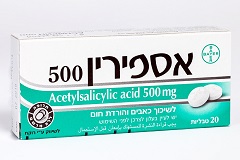Quest for the right Drug

אספירין 500 ASPIRIN 500 (ACETYLSALICYLIC ACID)
תרופה במרשם
תרופה בסל
נרקוטיקה
ציטוטוקסיקה
צורת מתן:
פומי : PER OS
צורת מינון:
טבליה : TABLETS
עלון לרופא
מינוניםPosology התוויות
Indications תופעות לוואי
Adverse reactions התוויות נגד
Contraindications אינטראקציות
Interactions מינון יתר
Overdose הריון/הנקה
Pregnancy & Lactation אוכלוסיות מיוחדות
Special populations תכונות פרמקולוגיות
Pharmacological properties מידע רוקחי
Pharmaceutical particulars אזהרת שימוש
Special Warning עלון לרופא
Physicians Leaflet
Adverse reactions : תופעות לוואי
4.8 Undesirable effects The following undesirable effects include all reported side effects following treatment with acetylsalicylic acid, including those following long-term high-dose therapy in rheumatoid arthritis patients. Apart from isolated cases, the incidence figures are based on short-term use of daily doses of not more than 3 g acetylsalicylic acid. The evaluation of adverse effects is based on the following frequency rates: Very common: 1/10 Common: 1/100 to < 1/10 Uncommon: 1/1,000 to < 1/100 Rare: 1/10,000 to < 1/1,000 Very rare: < 1/10,000 Not known: Frequency cannot be estimated from the available data. Blood and lymphatic system disorders: In rare to very rare cases serious bleeding has been reported, e.g. cerebral bleeding, especially in patients with uncontrolled hypertension and/or simultaneous treatment with anticoagulants, which in isolated cases may be life-threatening. Haemolysis and haemolytic anaemia have been reported in patients with severe glucose- 6-phosphate dehydrogenase deficiency. Bleeding, e.g. epistaxis, bleeding of gums, bruising or genitourinary bleeding with possible prolongation of bleeding time (see section 4.4). This effect can persist for 4 to 8 days after use. Gastrointestinal disorders: Common: Gastrointestinal disorders such as heartburn, nausea, vomiting, abdominal pain. Rare: Gastrointestinal ulcers, which in very rare cases can lead to perforation. Gastrointestinal bleeding, which in very rare cases can lead to iron-deficiency anaemia. Gastrointestinal inflammation. Not known: In the event of prior damage to the intestinal mucosa, multiple membranes can form in the intestinal lumen, which may result in subsequent stenosis (particularly with long-term treatment). Nervous system disorders Headache, dizziness, impaired hearing, tinnitus and mental confusion can be signs of overdose (see section 4.9). Skin and subcutaneous tissue disorders: Uncommon: Hypersensitivity reactions such as skin reactions. Rare: Hypersensitivity reactions such as severe skin reactions (including erythema multiforme exudativum). Immune system disorders: Rare: Hypersensitivity reactions of the respiratory tract, gastrointestinal tract and cardiovascular system, especially in asthmatic patients. Possible symptoms are: Drop in blood pressure, dyspnoea attacks, rhinitis, nasal congestion, anaphylactic shock or angio-oedema. Hepatobiliary disorders: Very rare: Elevated hepatic enzyme values. Renal and urinary disorders: Renal impairment and acute renal failure have been reported. Reporting suspected adverse reactions after authorisation of the medicinal product is important. It allows continued monitoring of the benefit/risk balance of the medicinal product. Any suspected adverse events should be reported to the Ministry of Health according to the National Regulation by using an online form: https://sideeffects.health.gov.il/

שימוש לפי פנקס קופ''ח כללית 1994
Mild to moderate pain, antipyretic, anti-inflammatory, acute rheumatic fever, rheumatoid athritis, prevention of thromboembolic phenomena
תאריך הכללה מקורי בסל
01/01/1995
הגבלות
תרופה שאושרה לשימוש כללי בקופ'ח
מידע נוסף
